.
Hard Work, Harsh Sun, High Winds, and Penguins
By Julie Thayer, Earthwatch Volunteer
.
At the end of 2017, I journeyed to Argentina for my first Earthwatch expedition. I had no idea what to expect, but I was eager to learn and contribute to research. I got home just before Christmas and immediately felt like I needed to go back. Because of this, it took me all of two days to decide to book a return trip to Camarones for 2018. The peace I felt about this was so instantaneous; I’ve never been more sure I made the right decision.
Returning, for me, wasn’t specifically about the penguins. It was more about the project as a whole. I believe in the research Dr. Gabi Blanco (co-lead scientist for the expedition) is doing, and I respect the methods she uses to achieve her goals. Spending time in the colony learning about and interacting with the penguins is just a major bonus.
.
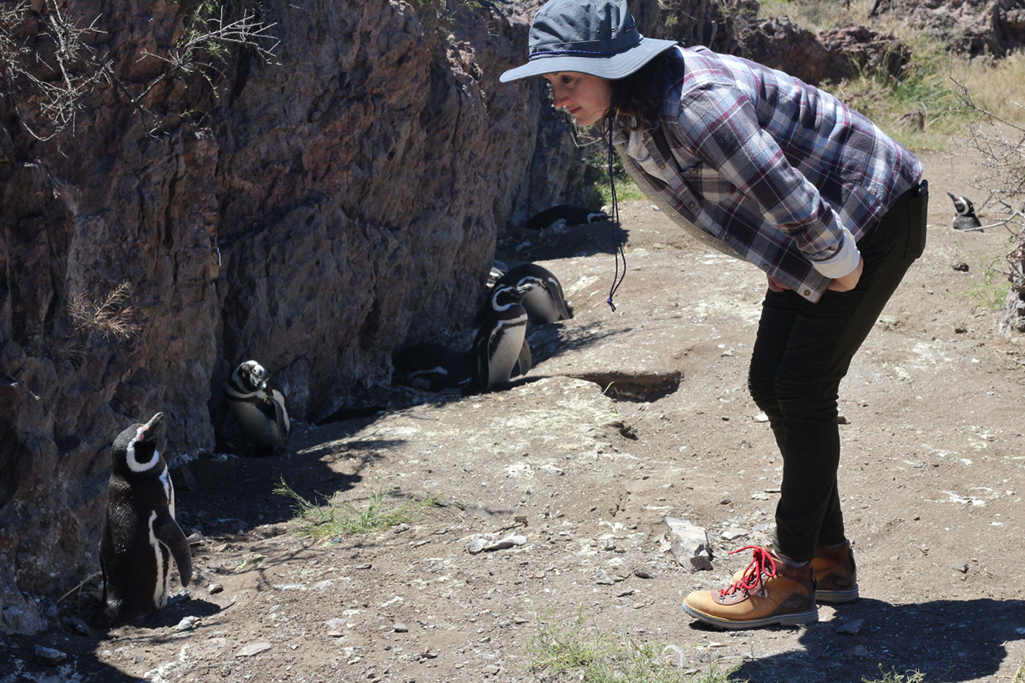
Julie observing penguins as the penguins observe Julie.
.
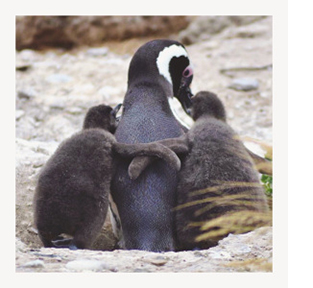 On December 3, 2018, our group traveled from the meeting point in Trelew to Camarones. I hopped out of the van once we reached our houses on the sea, and it honestly felt like I never left. Most of the people were different, but the place was exactly as I remembered it and the familiarity made my heart smile. After lunch and our project briefing, we spent the rest of our first day getting settled in for the week.
On December 3, 2018, our group traveled from the meeting point in Trelew to Camarones. I hopped out of the van once we reached our houses on the sea, and it honestly felt like I never left. Most of the people were different, but the place was exactly as I remembered it and the familiarity made my heart smile. After lunch and our project briefing, we spent the rest of our first day getting settled in for the week.
Bright and early the next morning, we headed for Cabo dos Bahias. Days two through five are the designated work days in the colony. Every day involves nest checks to see which parent is present, if there are eggs or chicks, and several other data points. All of this information is recorded daily for all monitored nests, and every three days all chicks are weighed and measured.
Aside from nest checks and measuring chicks, we were also on the lookout for specific penguins on which to deploy GPS devices. This was the biggest difference from last year. In 2017, the penguins were skinny and weak. Gabi placed a few devices early in that season and lost every single one. She stopped using them so as not to disadvantage the penguins any more in their struggle to get to enough food. This year, however, food was plentiful and the penguins were fat and strong. The GPS data is instrumental in discovering their foraging patterns at sea.
Literally, the first nest we checked once getting to our section had a penguin we were looking for. Field researcher Mica radioed Gabi and she was on her way from the other side of the colony. My job from that moment on was to keep the male in his nest until Gabi arrived. You would think that guarding a nest to keep a penguin inside shouldn’t be too difficult. Surprisingly, that’s not always the case. This fella wanted to GO and he did not care for my job one bit. Every time he walked out, I gently corralled him back in. Then he started to lose patience and flap his wings, run, and jump—whatever he could to get away. By the time Gabi arrived, I was sweating, but I succeeded in keeping him home.
.
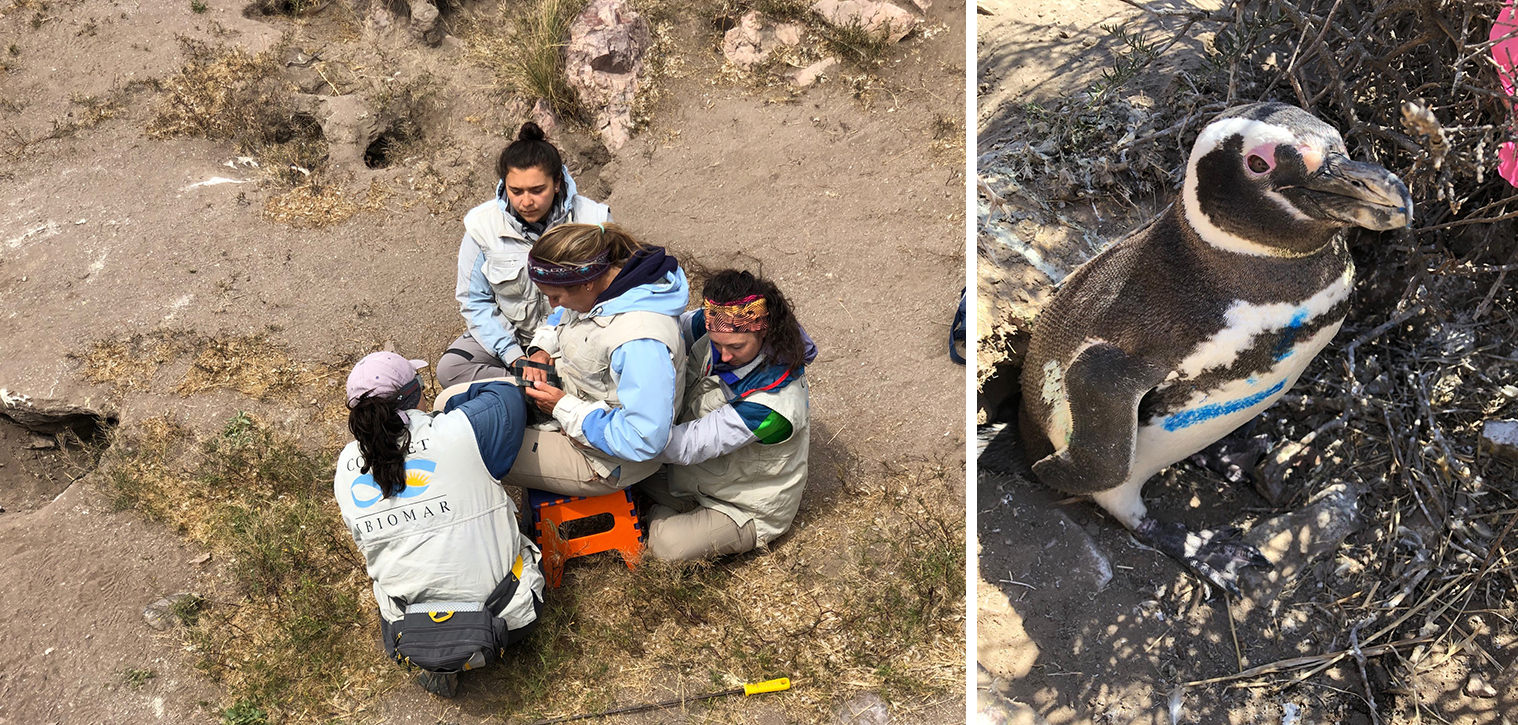
The team works to deploy a GPS device onto a penguin. / A male penguin that has been marked by researchers after nest checks.
.
I was excited to witness my first GPS placement, but instead, I got a bigger and better surprise. Gabi asked if I remembered how to hold the penguin’s feet from observing last year. I said yes, so she asked me to help. Of course, I accepted. Outwardly I kept calm, but inside I was geeking out.
On the surface, my level of excitement seems silly, but it is important to note volunteers do not generally handle the adults for our own safety. Every penguin has its own personality and there is a fine line between how they curiously cock their heads to study you vs. how they turn them to warn against you coming any closer. Adults are also deceptively strong for their roughly 15-pound frame. With previous experience under my belt, Gabi knew I was already aware of all these things and could help with minimal instruction. Thus, my additional responsibility for the week was born.
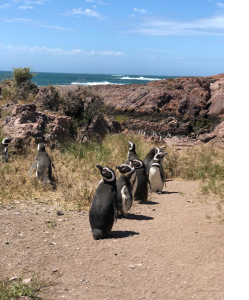 Over the course of our five days in the field, I experienced a lot. Each day I crisscrossed the entire colony and by the end of the week, my body felt it. I could not have been more grateful for the additional experience. When we loaded up to leave I was tired, really tired. It was the best possible kind of tired. The kind forged in hard work, little sleep, beautiful scenery, and great human interaction.
Over the course of our five days in the field, I experienced a lot. Each day I crisscrossed the entire colony and by the end of the week, my body felt it. I could not have been more grateful for the additional experience. When we loaded up to leave I was tired, really tired. It was the best possible kind of tired. The kind forged in hard work, little sleep, beautiful scenery, and great human interaction.
Many people ask why the expedition is only a week, and by the end of the trip, everyone can easily answer the question themselves. The days in the field are long, and the sun in Cabo dos Bahias is punishingly strong, so is the wind. It’s easy to forget just how strong the sun is—I’m talking necessary 50 SPF—because you don’t feel it when the winds are high. As soon as the winds die down, though, your skin feels afire. Being outside in the elements all day long takes a toll on you before you realize.
.
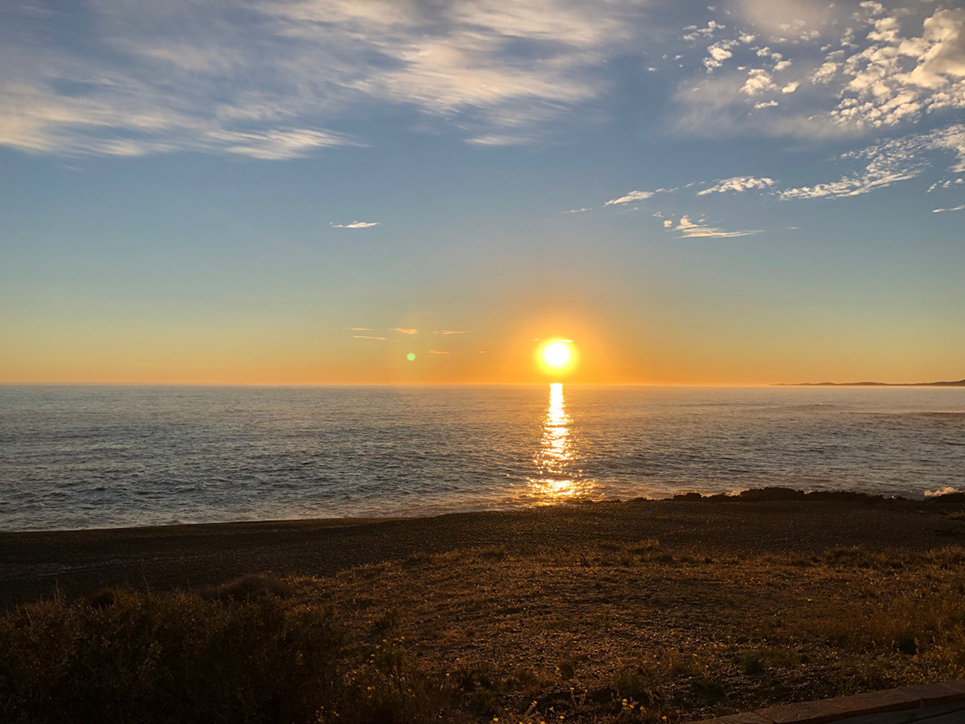
.
The week is not without plenty of fun, too—from singing and dancing in the van, and sharing mate or tereré, to morning sunrises over the Atlantic, Argentine wine, pleasant conversation over shared meals, and star gazing on clear nights.
The exciting thing to know is my love for this trip the first year was not an isolated incident. My appreciation only deepened the second time around. I love the work, simplicity of life, constant penguin vocalizations and curiosities, and chicks nuzzling into your lap for shade and protection. Most of all I love the friendships I’ve made. They’re bonded in hard work, little sleep, harsh sun, high winds, dirt, and large quantities of penguin poop. I’m pretty sure those are the ingredients of forever.
.
To learn more about this research, visit the expedition webpage: Trailing Penguins in Patagonia.
.
Sign up for the Earthwatch Newsletter
Be the first to know about new expeditions, stories from the field, and exciting Earthwatch news.